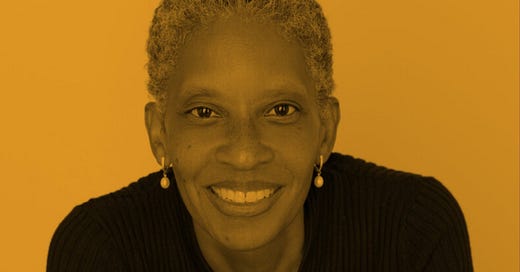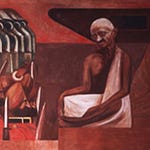This is part of a series honoring queer elders and ancestors. If a queer ancestor or elder has made a difference in your life, nominate them to be featured on Radical Soul. For other radical souls that aren’t queer or not quite an elder: nominate them here.
If you consider yourself an activist of any kind, I’m guessing you’re familiar with this conundrum: should you put your time and energy working toward justice with a small j or justice with a big j?
Justice with a small j is justice on a small scale or personal level. It’s volunteering for a crisis hotline or adopting a shelter dog. It can even be healing yourself.
Justice with a large j involves systemic change like lobbying for new legislation or creating educational campaigns about widespread issues.
When we have a heart for justice, we often feel pulled in many directions at once. It can feel overwhelming: this desire to be everywhere at once, do everything at once. And it’s easy to feel like we’re never doing enough.
In our interview, pastoral counselor, author, and Dharma Leader Dr. Pamela Ayo Yetunde explained how she decides on a day-to-day basis whether it’s a small j day or a big j day:
As someone who has made a vow to never burn out again, as someone who practices mindfulness, I pay attention to what tires me. Every day I do that. What is my energy level? What do I feel capable of doing? And what do I not feel capable of doing?
On days where she sees patients, it’s a “small j day.” On other days, she might focus on writing a book that has a much larger impact.
I love this perspective of paying attention to our energy levels and letting that guide what we attempt to accomplish. These are the kinds of guidelines that can make justice work sustainable.
I’m publishing two versions of our interview: the full 90-minute interview, as well as a 30-minute version (linked) with moments that highlight Ayo’s insights about justice with a small j and justice with a big j.
I recommend the full episode (which you can find on my website, as well as on Apple and Spotify) if you find comfort and insights in the details of how someone’s life and mission radically transforms over the years. You’ll hear about Ayo’s experiences being a part of the school integration initiative in the 60s and 70s and being bussed to a mostly White school. You’ll hear about her transformative experience with Sister Soulah, her work as an asylum officer, and a lot more.
About Dr. Pamela Ayo Yetunde
Dr. Yetunde, JD, MA, ThD, is pastoral counselor, spiritual director, chaplain, and Community Dharma Leader in the Insight Meditation Community. She is coeditor of the Nautilus Gold Award-winning Black and Buddhist: What Buddhism Can Teach Us About Race, Resilience, Transformation, and Freedom; and the author of Songbird Birdsong: The Story, Casting Indra’s Net: Fostering Spiritual Kinship and Community, Object Relations, Buddhism, and Relationality in Womanist Practical Theology, and the Frederick J. Streng Award-winning Buddhist-Christian Dialogue, U.S. Law, and Womanist Theology for Transgender Spiritual Care. Ayo is the cofounder of Center of the Heart, and Buddhist Justice Reporter. Her upcoming book Dearly Beloved: Prince, Spirituality, and This Thing Called Life will be published in April 2025. Learn more at pamelaayoyetunde.com.













Share this post